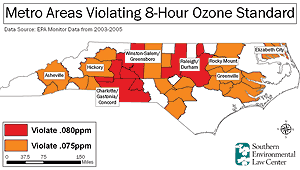Asheville’s air quality “borderline” under new standard
Every five years, the Environmental Protection Agency is required to take a hard look at its air-quality standards to verify that they’re strict enough to protect public health. During the latest assessment, announced March 12, the federal agency concluded that its restriction on ground-level ozone—the pollutant that causes smog—wasn’t up to snuff. In a decision based on the findings of some 1,700 public-health studies, the agency tightened the national ozone standard, revising the maximum allowable exposure over an 8-hour period to 0.075 parts per million, down from 0.08 ppm.

While such a change might seem minuscule, an EPA-commissioned study estimates that by the year 2020, the new standard would prevent a slew of health problems annually: 380 cases of chronic bronchitis nationwide, 890 nonfatal heart attacks, 1,900 hospital and emergency-room visits, 1,000 cases of acute bronchitis, 11,600 cases of upper- and lower-respiratory symptoms, 6,100 cases of aggravated asthma and up to 2,300 premature deaths, to be exact.
But despite that potential improvement, attorney David Farren of the Chapel Hill-based Southern Environmental Law Center believes the new standard is still too lax. The Clean Air Scientific Advisory Committee, an independent agency that advised the EPA to change the rule, “recommended that the standard be [a stricter] 0.070, rather than 0.075,” Farren explains. “In fact, the committee said that the standard should be somewhere between 0.060 and 0.070, but instead there was a political compromise, and lots of pressure from industry not to change the standard at all. So they split the baby with the standard of 0.075, which is not protective of public health. Even that relatively lax standard shows most North Carolinians are breathing unhealthy air—including in the Asheville area.”
According to a map released by the Southern Enviornmental Law Center, the Asheville metropolitan area joins a host of others that would be in violation—or nonattainment—of the new standard, based on EPA data. “EPA’s protocol is that when there’s a monitor in a … metropolitan area that violates, the entire area gets designated,” Farren maintains.
But Engineering Supervisor Ashley Featherstone of the Western North Carolina Regional Air Quality Agency points out that while Haywood and Graham counties are projected to exceed the standard, Buncombe County probably will not, based on ozone averages in recent years. “Our most recent three-year average says that we’re at 0.074 [ppm],” notes Featherstone—just a hair under the new limit. “It will be very borderline.”
In the past, she says, the EPA has designated nonattainment areas by county, not by metro area. A spokesperson from EPA Region 4 in Atlanta could not say which geographic parameter the agency will use in 2010, when it lists which areas have crossed over the threshold into unhealthy air.
In any case, things could be worse. Los Angeles, for example, clocks in at 0.112 ppm of smog-forming ozone, according to EPA data. Of the 646 counties nationwide that the agency monitors, 345 are projected to be in violation of the new limit.
Cliffside plant formally challenged
The North Carolina Division of Air Quality has taken a lot of heat from the state’s environmental groups since its Jan. 28 approval of an addition to Duke Energy’s coal-fired Cliffside power plant, now under construction. On March 19, staff attorney Scott Gollwitzer of Appalachian Voices filed an appeal challenging the agency’s decision to issue the permit. The action by the Boone-based nonprofit comes on the heels of a letter sent by a coalition of 19 environmental groups across the state, charging that the permit is illegal (see The Green Scene, March 12 Xpress).
Appalachian Voices’ move is only one component of a broader campaign against Cliffside. The Durham-based North Carolina Waste Awareness & Reduction Network also filed an appeal on March 19, and more are expected to roll in before the March 31 deadline.



Before you comment
The comments section is here to provide a platform for civil dialogue on the issues we face together as a local community. Xpress is committed to offering this platform for all voices, but when the tone of the discussion gets nasty or strays off topic, we believe many people choose not to participate. Xpress editors are determined to moderate comments to ensure a constructive interchange is maintained. All comments judged not to be in keeping with the spirit of civil discourse will be removed and repeat violators will be banned. See here for our terms of service. Thank you for being part of this effort to promote respectful discussion.